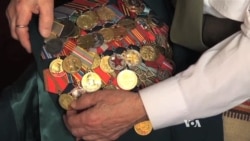Russia staged a huge military parade in Moscow Saturday to mark the 70th anniversary of victory in the World War II over Nazi Germany. VOA spoke to veterans of the conflict about their memories of the fighting, and their thoughts on current tensions between Russia and the West.
The scale of sacrifice still has the power to shock: An estimated 25 million Soviet soldiers and civilians died in World War II, the highest toll of any nation.
At his home near Moscow, war veteran Aleksandr Podobed proudly displays his medals as he prepares to attend the Victory Day events.
As a 12-year-old, he served as a spotter for partisan forces in occupied Belarus. Podobed recalled one occasion when he managed to distract a group of Nazi soldiers, who were about to stop a cart that was being used to smuggle supplies.
“I ran down the slope towars the soldiers,” he said. “They noticed me and shouted, 'Halt! Halt!' I kept running. They started to fire at me. I thought that they'd kill me. After I heard the cart pass safely, I fell down. The Germans dragged me and kicked my face with their boots. I was all beaten up.”
Fellow veteran Ivan Sokolov was stationed in Moscow as a cadet of the Artillery Academy, and later was an officer in the Artillery Corps. He described the first Nazi air attacks in 1941.
He noted that Nazi Propaganda Minister Joseph Goebbels had declared Russia would be burned down. "During the night of 21st July, at 22:10, 200 German planes began to destroy Moscow with incendiary bombs," he said.
The defense of Stalingrad is synonymous with the carnage of the eastern front. Two million people died as Nazi forces tried unsuccessfully to take the city. Vladimir Ananyev was a sapper in the Red Army.
“At the time we firmly believed that Germans would kill us in any case,” he said. “And this very fact drove us to fight until the end — and we did, each one of us in his own way. We were doing what we were supposed to do.”
At the end of the war a huge victory parade was staged in Moscow’s Red Square.
Saturday’s anniversary parade is intended to honor the events of 70 years ago. But many Western leaders, including German Chancellor Angela Merkel, have declined invitations to attend because of Russia’s military intervention in Ukraine. Veteran Sokolov said that was disrespectful.
“It hurts a lot,” he said, “because I went to Germany as a liberator. So I am amazed that Merkel, who knows perfectly well that she was saved by the Russians, who gave her the opportunity to study and become a politician, declares that she won't come to see the parade.”
Victory Day should also be an occasion for reflection about the suffering that followed 1945 in the Soviet Union, historian Andrei Zubov said.
He said the Soviet Union’s totalitarian regime did not fall then, but became stronger. "And that is another reason why this was a victory ‘with tears in our eyes’ — not only because of huge losses, but also because the victory had not brought about the end of the totalitarian Stalinist regime," he said.
Surviving veterans have been given special medals to mark the 70th anniversary of Victory Day. But the growing tensions between Moscow and the West have cast a shadow over events to commemorate the victory over Nazi Germany.





